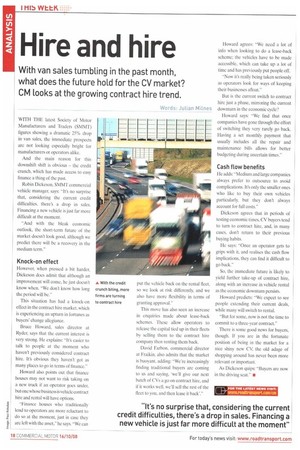Hire and hire
Page 18

If you've noticed an error in this article please click here to report it so we can fix it.
With van sales tumbling in the past month, what does the future hold for the CV market? CM looks at the growing contract hire trend.
Words: Julian Wines WITH THE latest Society of Motor Manufacturers and Traders (SMMT) figures showing a dramatic 25% drop in van sales, the immediate prospects are not looking especially bright for manufacturers or operators alike.
And the main reason for this downshift shift is obvious — the credit crunch, which has made access to easy finance a thing of the past.
Robin Dickeson, SMMT commercial vehicle manager. says: "It's no surprise that, considering the current credit difficulties, there's a drop in sales. Financing a new vehicle is just far more difficult at the moment.
"And with the bleak economic outlook, the short-term future of the market doesn't look good, although we predict there will be a recovery in the medium term."
Knock-on effect However, when pressed a bit harder, Dickeson does admit that although an improvement will come, he just doesn't know when. "We don't know how long the period will be."
This situation has had a knock-on effect in the contract hire market, which is experiencing an upturn in fortunes as buyers' change allegiance.
Bruce Howard, sales director at Ryder. says that the current interest is very strong. He explains: "It's easier to talk to people at the moment who haven't previously considered contract hire. It's obvious they haven't got as many places to go in terms of finance.
Howard also points out that finance houses may not want to risk taking on a new truck if an operator goes under, but one whose business is vehicle contract hire and rental will have options.
"Finance houses who traditionally lend to operators are more reluctant to do so at the moment, just in case they are left with the asset," he says. "We can put the vehicle back on the rental fleet, so we look at risk differently, and we also have more flexibility in terms of granting approval.
This move has also seen an increase in enquiries made about lease-back schemes. These allow operators to release the capital tied up in their fleets by selling them to the contract hire company then renting them back.
David Farbon, commercial director at Fraikin, also admits that the market is buoyant, adding: -We're increasingly finding traditional buyers are coming to us and saying, 'we'll give our next batch of CVs a go on contract hire, and if it works well, we'll sell the rest of the fleet to you, and then lease it back'." Howard agrees: "We need a lot of info when looking to do a lease-back scheme; the vehicles have to he made accessible, which can take up a lot of time and has previously put people off.
"Now it's really being taken seriously as operators look for ways of keeping their businesses afloat."
But is the current switch to contract hire just a phase, mirroring the current downturn in the economic cycle?
Howard says: "We find that once companies have gone through the effort of switching they very rarely go back. Having a set monthly payment that usually includes all the repair and maintenance bills allows for better budgeting during uncertain times."
Cash flow benefits lie adds: "Medium and large companies always prefer to outsource to avoid complications. It's only the smaller ones who like to buy their own vehicles particularly, but they don't always account for full costs."
Dickeson agrees that in periods of testing economic times, CV buyers tend to turn to contract hire, and, in many cases, don't return to their previous buying habits.
He says: "Once an operator gets to grips with it, and realises the cash flow implications, they can find it difficult to go back."
So, the immediate future is likely to yield further take-up of contract hire, along with an increase in vehicle rental as the economic downturn persists.
Howard predicts: "We expect to see people extending their current deals, while many will switch to rental.
-But for some, now is not the time to commit to a three-year contract."
There is some good news for buyers, though. If you are in the fortunate position of being in the market for a nice shiny new CV. the old adage of shopping around has never been more relevant or important.
As Dickeson quips: "Buyers are now in the driving seat." •
















































































































































































